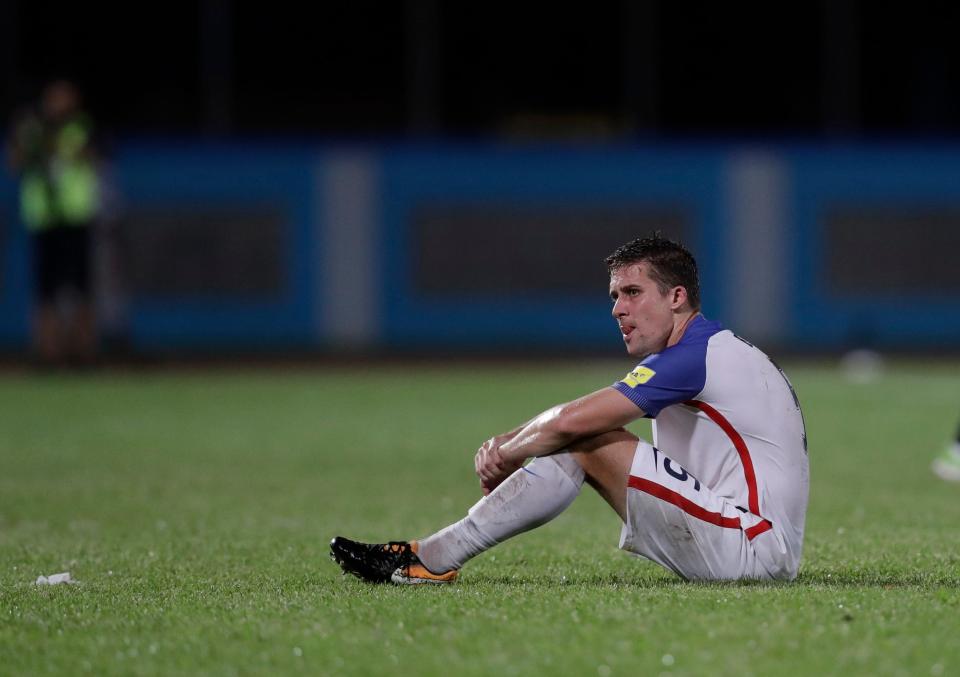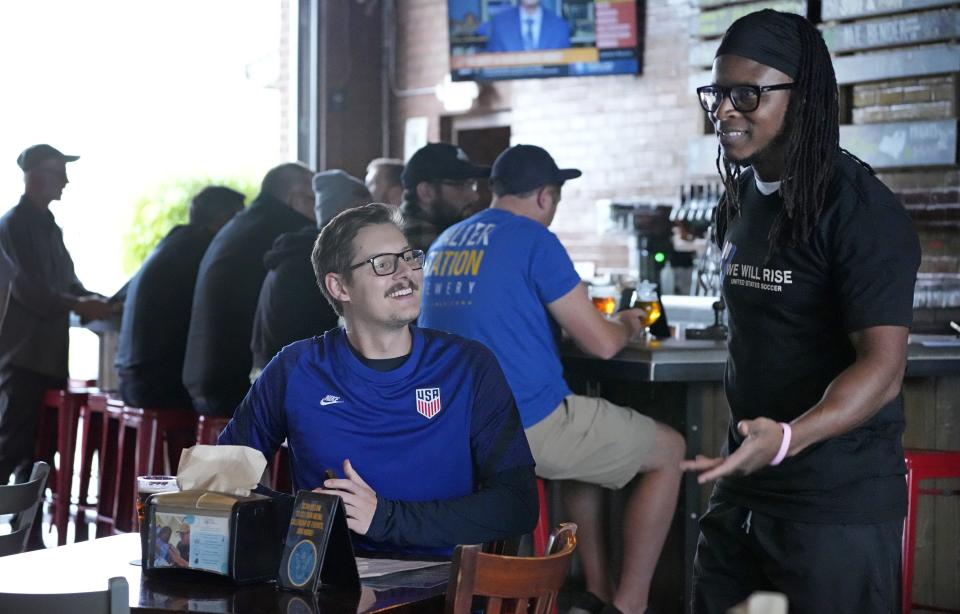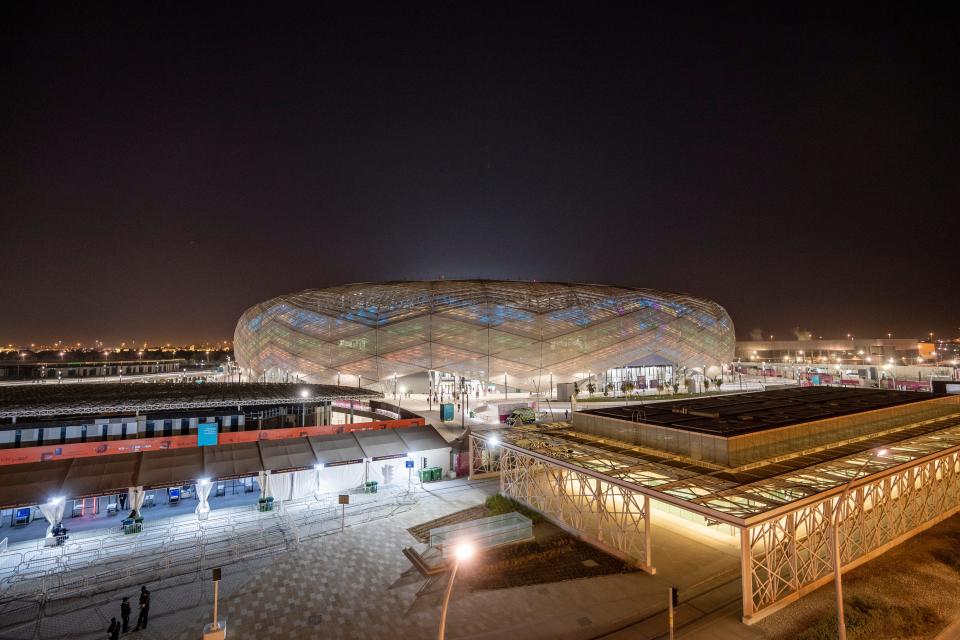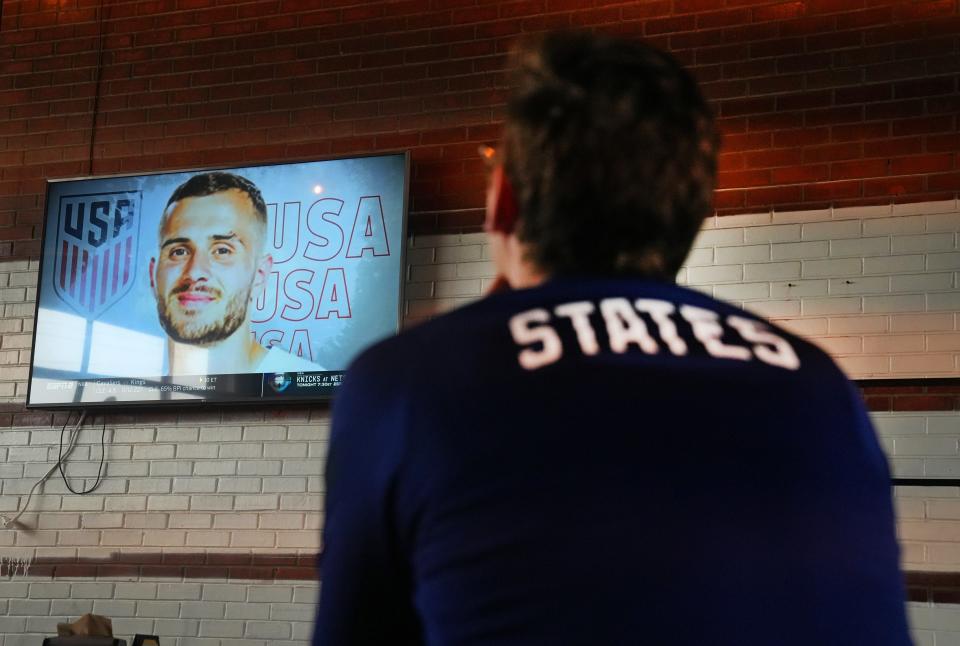For Phoenix-based U.S. soccer fans, trip to Qatar for World Cup brings excitement, unease
The night of Oct. 10, 2017 was supposed to be a coronation. In downtown Phoenix, the Tilted Kilt was “packed to the brim,” as Jamara Saah puts it. From across the Valley, American soccer fans had descended on the pub to watch the U.S. men’s national team earn qualification to an eighth straight FIFA World Cup.
Now, Saah is the president of the Phoenix chapter of American Outlaws, the preeminent supporters group for U.S. soccer diehards. Then, he was simply a superfan. Four days earlier, he had traveled to Orlando to watch the U.S. beat Panama, 4-0, along with Ryan Shirah, who was the AO Phoenix president at the time.
“Everyone's hyped, ready to go, we're gonna go to the World Cup,” Shirah said. “All we've gotta do is tie lowly Trinidad and Tobago.”
The memory of what happened next will forever be calloused into the American soccer psyche. Somehow, the U.S. lost. Passage to the 2018 World Cup — an American birthright for nearly three decades — would never come.
In Trinidad, images of players supine on the turf, jerseys stretched over their faces, became canon. In Phoenix, the scene replicated itself. “I saw multiple people wiping away tears,” recalled Jacob Phillabaum, a longtime member of AO Phoenix.

“A lot of people equate it to the death of a loved one,” Shirah said. “I don't know if it was quite that extreme for me, but certainly it was way beyond any other gut feeling disappointment.”
For the past five years, that memory has served to inspire passion projects for American soccer’s biggest fans. Saah became the AO chapter president. Phillabaum took over a leadership role. Shirah brought it to the extreme, traveling to World Cup qualifiers everywhere from Canada to Panama. Over the past decade, he’s now watched the national team in 11 countries.
Now, Saah and Shirah are among a boisterous group of fans who will travel to Qatar to support the U.S. in the World Cup. In their stead, Phillabaum will run watch parties at Walter Station Brewery, where AO is expecting overflow crowds.
One day last week, while watching the U.S. reveal its roster for the tournament, Phillabaum envisioned what the brewery will look like on Monday, when the U.S. opens its tournament against Wales.

“It's gonna be full,” Phillabaum said. “And that hair-tingling moment, that's gonna happen a lot more.”
In Qatar, meanwhile, both Saah and Shirah will fulfill a dream stricken by the national team’s failures a cycle ago. Both had planned to travel to Russia in 2018. Instead, neither has ever seen the men’s team play in the World Cup. “It’s eight years coming,” Saah said.
Openly, they both admit they would rather the World Cup be held elsewhere due to human rights abuses in the Gulf state. As reported by The Guardian last year, 6,500 migrant workers have died in Qatar since the World Cup was awarded in 2010. While less than 1% of those — 38 deaths — have been attributed to stadium construction, nearly all infrastructure projects in the country are tied to the World Cup.

None of that is lost on the traveling Americans.
“The human rights violations, worker rights, the kafala system that was in place — those things really put a bad taste (in your mouth),” Shirah said.
Both, though, have found some solace in reported improvements brought by increased global attention. Most notably, the country decided in 2016 to abolish the kafala system, which required companies to sponsor migrant workers and control their exit visas. It's a practice human rights organizations have criticized as tantamount to enslavement.
“That doesn't mean it's happening by the book, but just the fact that the government (made it) illegal, that's a step in the right direction,” Saah said. “It's not something that's gonna happen overnight so they are taking the step in the right direction. Does that mean, after the World Cup packs up and leaves, they're not gonna go back to where they were? I don't know. But that was where my morality came into play.”
One fan who spoke with The Republic added, “I can only imagine how insanely more excited I would be if it wasn't Qatar. If FIFA wasn't corrupt and Qatar had the best bid and there wasn't all the migrant and human abuses and everything like that.”
That fan asked to speak on the condition of anonymity for fear of retribution from the Qatari government.
“That's the problem, the fact that we're afraid,” the fan said. “That's it. Why are we afraid to speak our minds? That's the trouble. That's it in a nutshell.”

There are other challenges unique to this World Cup, too. For one, the November timing — as opposed to the typical slot in early summer — made getting time off work more difficult. Teachers and families with school-aged kids can’t go at all. And because fans of 32 teams will be crammed into a country smaller than Connecticut, accommodations had to be booked through the Qatari government, with the exception of exorbitantly priced luxury hotels.
“Either we're gonna be on top of each other and it's gonna be exciting to hang out and party with other fans from across the globe or it's gonna be the Fyre Fest,” Shirah said.
Regardless, the mindset is, as Shirah says, “We're going for the team, not for Qatar.”
For each American superfan, the team means something a little different. For Phillabaum, it’s a post-college community. For Shirah, it’s the pageantry of banging drums and singing with other fans, scratching his itch for “positive patriotism.” For Saah, it’s even more than that. After he moved to the U.S. from Liberia as a 12-year-old, it became a way of connecting with his new home.
In this tournament, that bond is elevated thanks to Tim Weah, one of the brightest young American stars. Weah grew up in New York, but he’s the son of Liberian president George Weah, widely regarded the best African player of all time. As a kid in Liberia, Saah grew up idolizing the elder Weah.
Naturally, he sees himself in the younger Weah.

“It's America's team but we all have a different cultural identity,” Saah said. “And we all still identify with this team.”
As the host of last week’s roster reveal show went through the squad, she announced each player’s hometown, echoing through the Walter Station speakers. Many, of course, grew up in the U.S. But illustrating Saah’s point, others were born in England or the Netherlands. Even more are second-generation immigrants, eligible to represent countries like Colombia and Ghana.
Come next week, they will all be wearing the red, white and blue. And in their corner will be the most dedicated of supporters, living out the dream they lost five years ago.
Theo Mackie covers Arizona high school sports and the Arizona Diamondbacks. He can be reached by email at theo.mackie@gannett.com and on Twitter @theo_mackie.
This article originally appeared on Arizona Republic: Phoenix-based U.S. soccer fans set out for World Cup in Qatar

